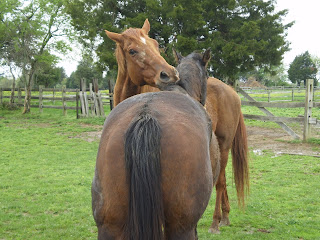 |
| Ziggy and Ceasar scratching each other's backs |
This is a good time of year to gain lots of brownie points with your horse. Horses are shedding their winter coats, and the combination of hotter sun and loosening hair makes for some itchy equines. There I am armed with shedding blades, brushes and nimble fingers. But the most important tool in my toolbox is time.
Scratching a horse from head to toe to relieve the seasons changes can take hours combined over days and weeks. Some may wonder if it’s worth it. Wouldn’t your time in the sunny spring be better spent riding or playing with your horse? The reality is that the hair will come off eventually by itself whether we put the effort in or not. But its really not just about the hair, or the itching.
Mutual grooming is a natural part of herd behavior to horses. Two horses will stand next to each other, nibbling on each other’s shoulder, neck, withers, back or flank. They do this mutually, and seem to know just where it is best to scratch. Horses show their appreciation and enjoyment of a good scratch by sticking out their upper lip, looking for a place to return the favor. My body, not being quite as long as a horse’s often lacks the proper location for a mutual groom. But I do my best to oblige, and often get a good shoulder scratch in return.
 |
| Grooming can become a herd event. Ziggy and Ceasar waiting for their turn. |
This behavior may seem like an automatic response to a nervous stimuli, but keep in mind that horses have big teeth, and people have thin skin, and too much instinct does not always end well. When horses are mutually grooming each other they clearly are aware of each other’s preferences and can communicate this and work with one another. When horses and humans are mutually grooming each other, the same concept applies. Riley has a very big mouth, and a strong desire to use her teeth, being a horse with thick skin herself. However, when she goes to scratch me, and I ask her to be gentle with me, she does.
Mutual grooming is one important way that horses build bonds with one another. It strengthens their friendship and trust, and it proves to the pair that they are welcoming each other into their personal space (horses have a lot of ideas about personal space). The areas they scratch are areas that they cannot reach themselves. How good does it feel to have a good friend scratch your back, when you can’t get to it? But would you let a stranger do it, no matter how itchy you were? I recall the first time that Lucy actually was able to express her enjoyment of a scratch by me, after we had built a relationship and trust. Now she comes over and plants the part of herself that she wants scratched in front of me.
As humans, though our bodies aren’t quite as long, we do have an advantage over their equine pasture mates. Belly scratching.
 |
| Bucky enjoying a good belly scratch |
In herds, horses often form pair bonds. This is two horses who become particularly attached, even though the herd may be much larger. Springtime hormones aside, it is these pairs that are typically seen grooming one another. Sometimes it is the little things in a relationship that make up the big things. Sometimes there is more value in just being there to scratch someone’s back, than in all the fancy maneuvers, cookies, presents or words you can say. Taking the time to do nothing but help your friend with an itch can mean the difference between a withholding relationship and an unselfish openness.
 |
| Pair bond Lucy and Buddy. Taken seconds before Lucy decided that I was a better scratcher than Buddy :) |
Today’s a good day to go "scratch" your horse, husband, kid, friend or dog, and let them know that there is nowhere else in the world you would rather be than here with them in this moment.

Love it! and the ticks seem to be abundant!
ReplyDeleteMy mare uses her upper lip to mutually groom me. :~)
ReplyDeleteGreat post! Who doesn't enjoy a good scratch to get at that itchy spot!
ReplyDelete